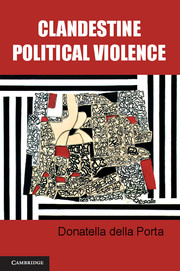Book contents
- Frontmatter
- Contents
- Acknowledgments
- Acronyms
- 1 Political Violence and Social Movements
- 2 Escalating Policing
- 3 Competitive Escalation
- 4 The Activation of Militant Networks
- 5 Organizational Compartmentalization
- 6 Action Militarization
- 7 Ideological Encapsulation
- 8 Militant Enclosure
- 9 Leaving Clandestinity?
- 10 Clandestine Political Violence
- Primary Sources
- Bibliographical References
- Index
8 - Militant Enclosure
Published online by Cambridge University Press: 05 April 2013
- Frontmatter
- Contents
- Acknowledgments
- Acronyms
- 1 Political Violence and Social Movements
- 2 Escalating Policing
- 3 Competitive Escalation
- 4 The Activation of Militant Networks
- 5 Organizational Compartmentalization
- 6 Action Militarization
- 7 Ideological Encapsulation
- 8 Militant Enclosure
- 9 Leaving Clandestinity?
- 10 Clandestine Political Violence
- Primary Sources
- Bibliographical References
- Index
Summary
KEEPING COMMITMENT IN THE UNDERGROUND: AN INTRODUCTION
The former militants of the (US-supported) Mujahidin resistance in Afghanistan, as well as the numerous armed conflicts in the Middle East, Chechnya, or former Yugoslavia, which contributed to the spreading of a military vision, are particularly relevant to the development of the global network of Islamic fundamentalism. The Gulf War in 1990–1 was a turning point because it “brought U.S. troops to the Arabian peninsula. The movement that became the global Salafi jihad might have faded away but for the continuous presence of these troops” (Sageman 2004: 40). After September 11, the war in Afghanistan pushed Salafi jihadists to look for protection in other countries such as Pakistan and Iran, where they disseminated military skills and ideological motivations (Hafez 2007: 166ff.). Similarly, resistance to the American invasion of Iraq involved a heterogeneous coalition, made up not only of Salafi jihadists but also of members of Hussein’s Ba’ath Party; again former soldiers and secret service officers played an important role (ibid.: 37).
During the resistance against the Soviet occupation, thousands of Arab Afghans – many from upper- and middle-class families of the Arabic Gulf region – joined the various groups of Mujahidin with headquarters in Peshawar, Pakistan. This helped in developing the notion of universal Muslim brotherhood. Notwithstanding some tensions with the Afghanis, participation on the battlefield fostered feelings of solidarity. One explained: “For me, this battle was really a big boost that motivated me to carry on. It gave us the assurance that no one is hit except if that was destined for him by Allah” (Kohlmann 2004: 13). As Abu Abdel Aziz declared: “The Jihad in Afghanistan was a great experience. Whoever was involved in this experience had the great desire that Allah would keep them engaged in the Jihad” (ibid.: 17). Osama bin Laden himself stated: “What I lived in two years there, I could have not lived in a hundred years elsewhere” (cited in Esposito 2002: 9).
- Type
- Chapter
- Information
- Clandestine Political Violence , pp. 235 - 262Publisher: Cambridge University PressPrint publication year: 2013



